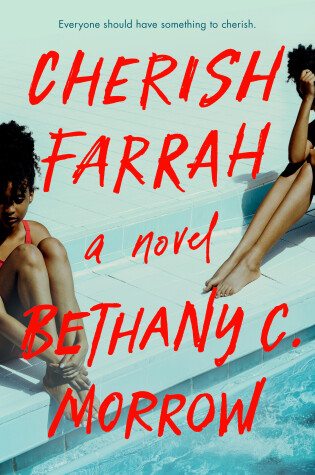
Named a Most Anticipated Book of 2022 by PopSugar, Ms. magazine, Medium, Book Riot, BookPage, CrimeReads, Tor Nightfire, Bookshop, Book Talk, BiblioLifestyle, and more!
AN APRIL 2022 BELLETRIST BOOK CLUB PICK
“Morrow uses her heroine’s warped perspective to examine painful truths about race and class in America, but this isn’t a book intended to teach anyone a lesson, except maybe: Be careful. You never know who’s really in control.”—Los Angeles Times
From bestselling author Bethany C. Morrow comes a new adult social horror novel in the vein of Get Out meets My Sister, the Serial Killer, about Farrah, a young, calculating Black girl who manipulates her way into the lives of her Black best friend’s white, wealthy, adoptive family but soon suspects she may not be the only one with ulterior motives. . . .
Seventeen-year-old Farrah Turner is one of two Black girls in her country club community, and the only one with Black parents. Her best friend, Cherish Whitman, adopted by a white, wealthy family, is something Farrah likes to call WGS—White Girl Spoiled. With Brianne and Jerry Whitman as parents, Cherish is given the kind of adoration and coddling that even upper-class Black parents can’t seem to afford—and it creates a dissonance in her best friend that Farrah can exploit. When her own family is unexpectedly confronted with foreclosure, the calculating Farrah is determined to reassert the control she’s convinced she’s always had over her life by staying with Cherish, the only person she loves—even when she hates her.
As troubled Farrah manipulates her way further into the Whitman family, the longer she stays, the more her own parents suggest that something is wrong in the Whitman house. She might trust them—if they didn’t think something was wrong with Farrah, too. When strange things start happening at the Whitman household—debilitating illnesses, upsetting fever dreams, an inexplicable tension with Cherish’s hotheaded boyfriend, and a mysterious journal that seems to keep track of what is happening to Farrah—it’s nothing she can’t handle. But soon everything begins to unravel when the Whitmans invite Farrah closer, and it’s anyone’s guess who is really in control.
Told in Farrah’s chilling, unforgettable voice and weaving in searing commentary on race and class, this slow-burn social horror will keep you on the edge of your seat until the last page.
I think I need to avoid this author from now on. I keep giving her a shot because I really liked her sci-fi novella Mem, but this is the second novel in a row that's left me very underwhelmed. She says this is not YA, but I can't see this appealing to anyone who isn't a YA reader. Much like her novel A Song Below Water, there is just so much stuffed into these pages and so very little editing done to focus it. It really seems like two books smushed together - one about psychopaths and one that tries to be a horror social commentary in the vein of Get Out, at least according to the book's many reviews.
The whole psychopath thing was inexplicably boring. The main character, Farrah, and her mother both seem to be psychopaths, but the main way we know this is because the author exhaustively details how deliberately they arrange their facial features and fake their body language. Sometimes they do this to have multi-paragraph long silent conversations. 75% of the book is a description of something like a raised eyebrow followed by paragraphs explaining what this raised eyebrow means. And Farrah and her mom are repeatedly described as having a "tug of war game" of dominance going on between them but other than pages and pages of descriptions of silent conversations conveyed by looks in their eye and tilted chins and pointed expressions, there isn't much more to this. At one point Farrah even describes how the furniture in her parent's home is arranged to offend her as part of this tug of war game and if that sounds strangely silly, that's because it was.
The supposed social commentary part is bizarre - I thought for sure that the point would be that white people can't even be completely anti-racist no matter how hard they try, so they needed Farrah there to take the brunt of it so that they could spare their adopted Black daughter. But by the time I got to the end, it seemed like just a general creepy people doing creepy things story? In which case I'm not really sure the comparison to Get Out makes any sense.
Despite feeling like there were two distinct stories competing for attention, there wasn't really any plot. And yet, somehow it was SO very wordy. It felt like a first draft that needed someone to find the bones of the story and excavate them from all of the words.
Reading updates
-
Started reading
-
2 April, 2022:
Finished reading
-
2 April, 2022:
Reviewed
